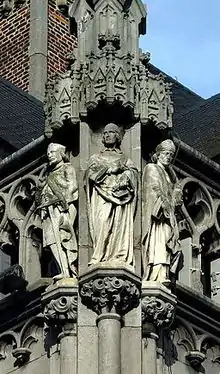Wazo of Liège
Wazo of Liège (c. 985 – 1048) was bishop of Liège from 1041 to 1048, and a significant educator and theologian. His life was chronicled by his contemporary Anselm of Liège.

During this period Liège became known as an educational center. Wazo, who had himself studied under Heriger of Lobbes, served as scholaster under Notker of Liège before succeeding Notker as bishop.[1]
He is noted also for his nuanced approach to cases of heresy (not common in his day). In a letter he wrote to Roger, Bishop of Châlons,[2] he quoted the New Testament Parable of the Tares and argued "the church should let dissent grow with orthodoxy until the Lord comes to separate and judge them".[3]
He was involved in the period 1021–5 in a controversy with John, canon and provost in Liège; Durandus of Liège, then bishop, had Wazo leave for a time.[4] His election as bishop in 1041 was strongly contested,[5] with Emperor Henry III against him.
Notes
- C. Stephen Jaeger (1994), The Envy of Angels: Cathedral Schools and Social Ideas in Medieval Europe, 950–1200, p. 55.
- "The Birth of Heresy, a Millennial Phenomenon". Archived from the original on 14 April 2010. Retrieved 26 June 2007.
- Jeffrey Burton Russell, Dissent an Order in the Middle Ages: The Search for Legitimate Authority p. 23 (New York: Twayne Publishers 1992)
- Jaeger, pp. 205–8.
- Jaeger, pp. 208–9; Jaeger sees the conflict as between the educational tradition of Brun of Cologne, and monastic tradition; and convicts Wazo of a lack of urbanity.
Further reading
- Klaus-Gunther Wesseling (1998). "Wazo (Waso, Wazzo, Watzo, Watho, gelegentlich auch als Gazo oder Guazo beurkundet) von Lüttich". In Bautz, Traugott (ed.). Biographisch-Bibliographisches Kirchenlexikon (BBKL) (in German). Vol. 13. Herzberg: Bautz. cols. 394–398. ISBN 3-88309-072-7.